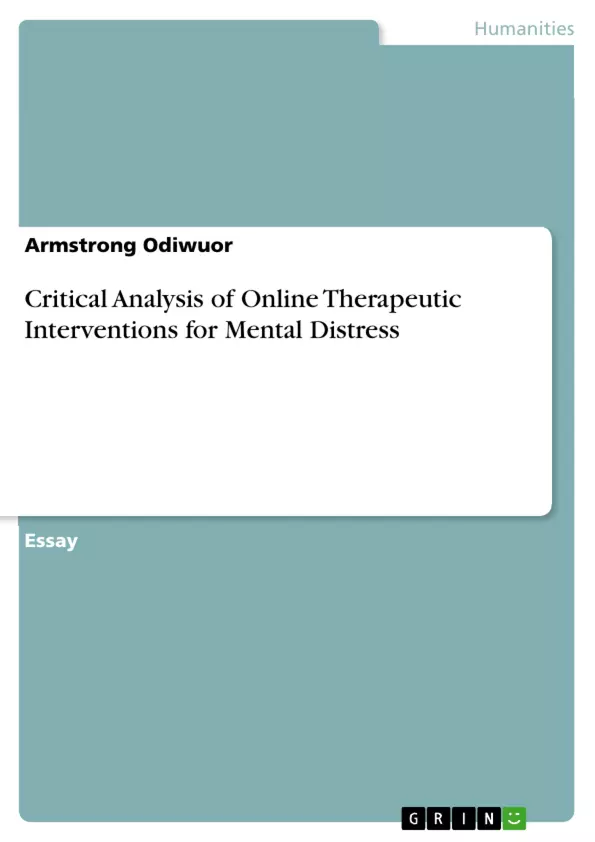This paper critically analyzes the effectiveness of online therapeutic interventions, focusing on cognitive restructuring as part of cognitive behavioral therapy (CBT) for individuals with mental distress, particularly post-traumatic stress disorder (PTSD). Drawing on studies that highlight the benefits of internet-based CBT, the paper examines how cognitive restructuring aids in reducing symptoms of anxiety and depression by challenging and replacing negative thought patterns. It explores the flexibility and accessibility of these interventions while discussing key challenges, such as low adherence rates and ethical concerns, including privacy, informed consent, and cultural sensitivity. The analysis highlights both therapist-guided and unguided internet-based CBT programs, addressing their relative effectiveness. Intersectional issues like internet access and cognitive abilities are also considered. Ultimately, the paper underscores the need for further research into the limitations of these programs, particularly regarding adherence and the potential for more personalized, culturally sensitive interventions.
Inhaltsverzeichnis (Table of Contents)
- Introduction
- Critical Analysis
- Effectiveness of Internet-Based Cognitive Restructuring
- Ethical Issues
- Intersectional Issues
- Adherence
Zielsetzung und Themenschwerpunkte (Objectives and Key Themes)
This essay critically analyzes the effectiveness of internet-based cognitive restructuring as a therapeutic intervention for anxiety and depression, particularly within the context of Post-traumatic stress disorder (PTSD). It examines existing research to assess the intervention's efficacy, considering both positive findings and potential limitations.
- Effectiveness of internet-based cognitive restructuring for anxiety and depression.
- Ethical considerations in online therapeutic interventions, including privacy, informed consent, and therapeutic alliance.
- Intersectional challenges related to internet access, cognitive abilities, and program design.
- Adherence rates and factors influencing treatment completion.
- Comparison of therapist-guided versus unguided online interventions.
Zusammenfassung der Kapitel (Chapter Summaries)
The Introduction provides background information on cognitive restructuring within the framework of Cognitive Behavioral Therapy (CBT) and its potential application for PTSD. It establishes the study's aim to analyze the effectiveness of internet-based cognitive restructuring, acknowledging both its benefits and potential drawbacks.
The Critical Analysis section reviews several studies on the effectiveness of internet-based cognitive restructuring in reducing anxiety and depression. It compares findings from different studies, highlighting both positive outcomes (reduced symptoms) and challenges (adherence rates). The section also notes variations in methodology, such as the use of different outcome measures and the level of therapist guidance.
The Ethical Issues section discusses concerns about privacy, informed consent, the therapeutic alliance, and cultural sensitivity in online interventions. It analyzes how existing research addresses these issues and highlights areas needing improvement.
The Intersectional Issues section examines factors like internet access, cognitive abilities, and program design that influence the accessibility and effectiveness of internet-based cognitive restructuring across diverse populations. It points out the need for further research to better understand these factors' impact.
Schlüsselwörter (Keywords)
Internet-based cognitive restructuring, Cognitive Behavioral Therapy (CBT), anxiety, depression, Post-traumatic stress disorder (PTSD), online therapy, ethical considerations, accessibility, adherence, therapeutic alliance, cultural sensitivity.
- Arbeit zitieren
- Armstrong Odiwuor (Autor:in), 2024, Critical Analysis of Online Therapeutic Interventions for Mental Distress, München, GRIN Verlag, https://www.hausarbeiten.de/document/1511978


